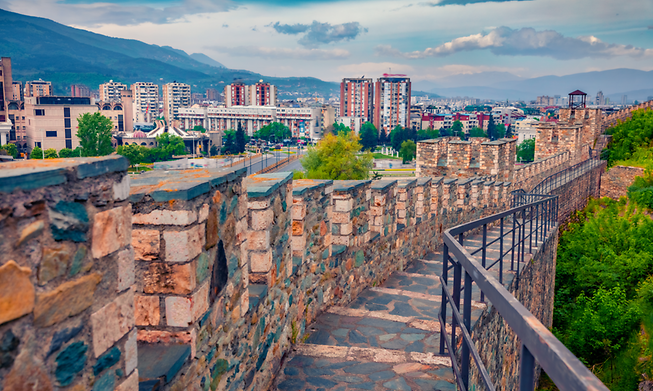Balkan countries sign deal to unlock EU enlargement talks

Two Balkan states signed an agreement that will allow North Macedonia and Albania to formally start negotiations to join the European Union, a process long-delayed by bilateral quarrels between countries in the volatile region.
Bujar Osmani, North Macedonia’s foreign minister, signed the protocol with his Bulgarian counterpart in Sofia, Bulgaria’s capital, on Sunday.
The move came a day after North Macedonia’s parliament approved a European Union proposal that aims to help resolve a Balkan dispute and unlock the organisation’s enlargement.
Bulgaria had for years blocked the start of accession talks due to a conflict over the recognition of the Macedonian language and the rights of Bulgarian nationals within North Macedonia. Albania’s negotiations were also delayed, as it has been coupled with North Macedonia in the membership procedures.
Roadmap for resolution
The document signed on Sunday will guide Bulgaria and North Macedonia through resolving the disagreements.
“For us it’s a historic opportunity that after 17 years of candidate status the Republic of North Macedonia gets the opportunity to start accession negotiations with the European Union,” Osmani told reporters.
On Saturday, 68 lawmakers in North Macedonia’s 120-member assembly voted in favour of a motion to let the government back a framework for negotiations offered by the EU.
By approving the EU proposal, “we remain on the only road to which nobody offered an alternative,” Prime Minister Dimitar Kovacevski had said on Thursday at the start of a debate that lasted for three days. “We’re starting to quickly move and change the country in the process of negotiations.”
'Difficult tradeoffs'
The deal may allow North Macedonia to hold its first intergovernmental conference with the EU -the formal start of negotiations - “within the next few days,” European Commission President Ursula von der Leyen told lawmakers in Skopje.
The US State Department welcomed the vote. “We recognise the difficult tradeoffs considered in this compromise, which acknowledges and respects North Macedonia’s cultural identity and the Macedonian language,” Secretary of State Antony Blinken said in an emailed statement.
The former Yugoslav country has faced multiple hurdles on its path to Western integration, including having to change its official name to resolve a dispute with neighboring Greece before joining NATO in 2020.
Still, the deal has sparked tensions in North Macedonia, where thousands have protested for two weeks. The opposition said the EU proposal didn’t sufficiently guarantee recognition of the country’s language and national identity. Both the government in Skopje and EU officials rejected these claims.
Opposition lawmakers heckled Kovacevski on Thursday, holding posters with the sign “No!” and blowing vuvuzelas, a kind of horn, as he spoke. Thousands protested outside the parliament building, with ten people detained.
The EU-backed deal seeks to alleviate doubts among Balkan countries that the bloc is still committed to enlargement, amid concern of growing Russian influence. Their worries that they will be left behind have only intensified since the start of war in Ukraine, which prompted EU leaders to advance a decision to approve both Ukraine and Moldova as membership candidates.
©2022 Bloomberg L.P.
No comments:
Post a Comment